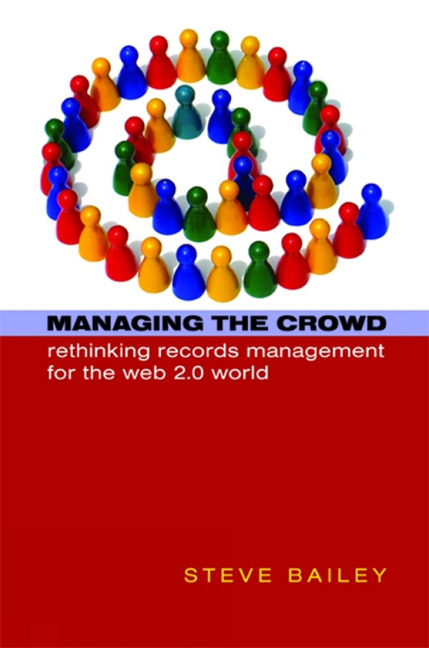Book contents
- Frontmatter
- Dedication
- Contents
- Foreword
- Preface
- Part 1 The Nature Of The Changing World
- Part 2 Is records management no longer fit for purpose?
- 5 The need for critical professional self-examination
- 6 ‘Not all information sources are records’
- 7 The centralized command and control ethos
- 8 ‘Regardless of format...’
- 9 Appraisal, retention and destruction
- 10 The problems with applying existing approaches to appraisal in the Web 2.0 world
- Part 3 Records Management.0 And The Future Of Records Management 121
- Index
6 - ‘Not all information sources are records’
from Part 2 - Is records management no longer fit for purpose?
Published online by Cambridge University Press: 08 June 2018
- Frontmatter
- Dedication
- Contents
- Foreword
- Preface
- Part 1 The Nature Of The Changing World
- Part 2 Is records management no longer fit for purpose?
- 5 The need for critical professional self-examination
- 6 ‘Not all information sources are records’
- 7 The centralized command and control ethos
- 8 ‘Regardless of format...’
- 9 Appraisal, retention and destruction
- 10 The problems with applying existing approaches to appraisal in the Web 2.0 world
- Part 3 Records Management.0 And The Future Of Records Management 121
- Index
Summary
Questions addressed in this chapter
• What are the pros and cons of our deliberate focus on managing records?
• What are the dangers implicit in our reluctance to embrace change?
• Why are all information sources potentially now as valuable and powerful as records and worthy of equal consideration?
The inherent value of records
As any student of archives or records management will tell you, while all records are information, not all information sources are records. In the past there have been sound and defensible reasons for making this distinction. Records were self-evidently more important than information thanks to their evidential qualities. Records are what prove what you did, why you did it and what results it had. They are what lawyers, accountants and auditors want to see, because of the guarantees of quality and accuracy that go hand in glove with their status as ‘records’ – a status ensured through our insistence on adherence to standards of content, context and structure and qualities of authenticity, completeness, reliability and fixity.
These characteristics deservedly set the bar high and allowed records managers to focus on the subset of the information that met these criteria and could, therefore, be justly described as records. Formalized business processes helped create further clear blue water between information and records, with well established and unbending procedures for the generation of the minutes of meetings, memoranda and other business communications. In the pre-PC era, even the physical format of records was closely controlled, such as with the account book or the memo. Finally, the strictures imposed by file registry systems and the concept of the registered file ensured that records were routinely identified and logged even before their creation.
The consequences of our focus on records
Records management has, thus, long been defined by the narrow - ness of its focus. This is not a criticism, simply an acknowledgement that the profession emerged and developed to manage a very specific type of information and did not concern itself with the broader picture of information creation and use. Indeed, for many decades, this selectivity has been at the core of our professional strength and has hitherto served us well. By ring-fencing our scope we were able to produce a far more coherent and detailed set of professional principles than would otherwise have been the case.
- Type
- Chapter
- Information
- Managing the CrowdRethinking records management for the Web 2.0 world, pp. 59 - 66Publisher: FacetPrint publication year: 2008



